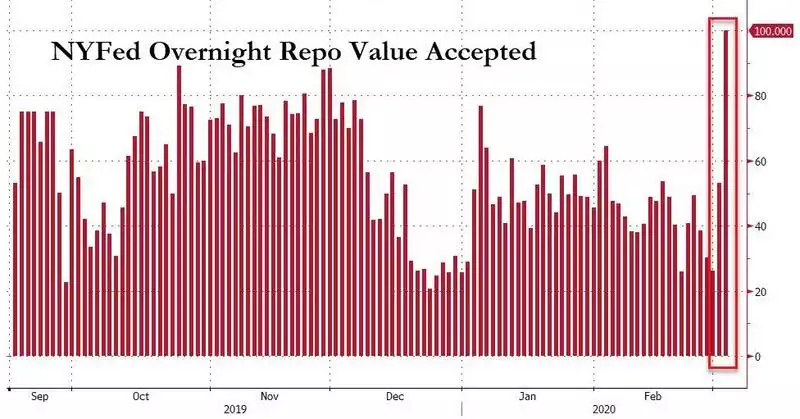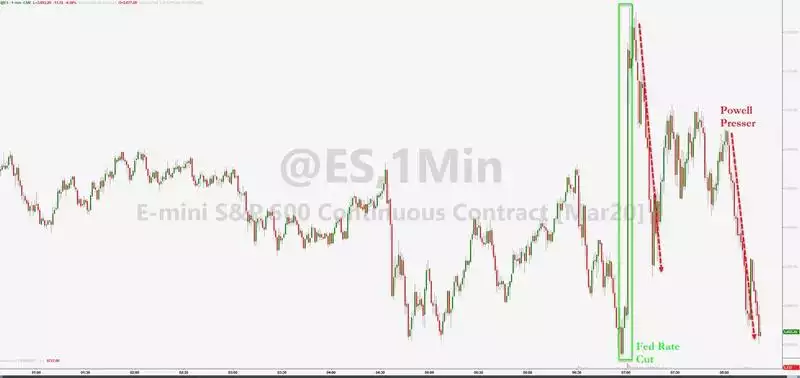Did the Market Just Figure it Out?
News
|
Posted 04/03/2020
|
21772
Yesterday the RBA dropped our interest rates by 0.25% to another new low of just 0.5% and the 4th cut in just 12 months. The move was also significant in that it was the first cut by a central bank since the Coronavirus outbreak. Last night the US Fed joined the party by doing a mid month emergency rate cut, by a full 0.5% ahead of their scheduled March meeting. For context that is the largest rate cut since the onset of the GFC and only the 9th emergency rate cut in all history. What’s not getting press however is that the rate cut was also accompanied by the biggest liquidity shortage on the overnight Repo market since the emergency measures started last September with the Fed having to tip in nearly $109billion overnight. But don’t call it QE….

In our central bank driven market that would normally be cause for irrational exuberance and initially it was with shares spiking on the news. However Wall Street not only gave up those gains but went on to fall to end the session nearly 3% down across each of the Dow, S&P500 (chart below) and NASDAQ. Gold on the other hand surged 3% in USD terms but the US rate cut saw the AUD increase and we saw 2/3 that gain in AUD terms, up 2.3% and silver up 1.8%.

That subsequent drop was likely a number of factors. The Fed Chair hosed down more cuts (but left the door wide open) and the market likely had the realisation that an emergency rate cut is maybe not a great sign for the economy their investment portfolio somehow has to make earnings in…. Additionally the market was unimpressed by the G7’s response.
Last night the G7 finance ministers held an emergency meeting and afterwards released a statement saying “G7 finance ministers are ready to take actions, including fiscal measures where appropriate, to aid in the response to the virus and support the economy during this phase,"
From The Economic Times:
"This is a disappointment compared to previous hopes of an immediate and coordinated fiscal package and interest rate cuts," said Jennifer McKeown, an economist at Capital Economics in London.
Disappointment notwithstanding, the actions of the RBA and Fed clearly signal more to come around the world as currency wars will prevail with everyone wanting a comparative advantage by dropping rates and hopefully their currency. That word ‘comparative’ is the problem. If everyone is doing the same it just becomes a race to the bottom by everyone. Critically too, remember this is all BEFORE a recession which is usually when you have healthy rates to drop. We are near zero bound (and plenty of negative around the world) already. There are few bullets left in the gun. It seems the market is figuring this out maybe…
Yesterday’s drop by the RBA was partly anticipatory. They know what’s coming in addition to what’s been. The predictions are not great. From ABC News:
“However, new research from ANU economics professor and former Reserve Bank board member Warwick McKibbin and PhD student Roshen Fernando warned that GDP loss from the most severe outbreak could be as much as 7.9 per cent, with even a less severe global pandemic possibly taking 2 percentage points off Australian growth in 2020.”
Not surprisingly the RBA, like the Fed and G7, left the door open for more:
"The board is prepared to ease monetary policy further to support the Australian economy,"
Of course when you are this low you have little room to go and little effect to implement when it gets worse. The market seems to have figured this out and hence the drops in shares and rise in metals. Today’s GDP print in Australia will be interesting as it will incorporate the effects of the bushfires but little of the full impact of Coronavirus.
The Fed isn’t completely ignorant of the problem they have created. Just last week former Dallas Fed President and FOMC member, Richard Fisher said this:
"Does The Fed really want to have a put every time the market gets nervous? ...Coming off all-time highs, does it make sense for The Fed to bail the markets out every single time... creating a trap?"
"The Fed has created this dependency and there's an entire generation of money-managers who weren't around in '74, '87, the end of the '90s, and even 2007-2009.. and have only seen a one-way street... of course they're nervous."
"The question is - do you want to feed that hunger? Keep applying that opioid of cheap and abundant money?"
the market is dependent on Fed largesse... and we made it that way...
...but we have to consider, through a statement rather than an action, that we must wean the market off its dependency on a Fed put."
But Trump will have none of that:
“The Federal Reserve is cutting but must further ease and, most importantly, come into line with other countries/competitors. We are not playing on a level field. Not fair to USA. It is finally time for the Federal Reserve to LEAD. More easing and cutting!”
Clearly an artificially high sharemarket makes America Great (Again)….